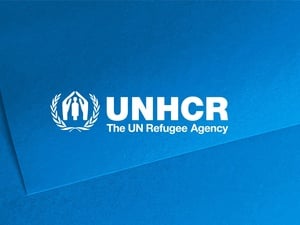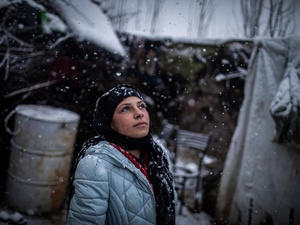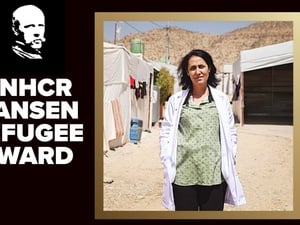UNHCR special envoy cautions on quick return of Iraqi exiles
UNHCR special envoy cautions on quick return of Iraqi exiles

UNHCR Special Envoy for Iraq, Dennis McNamara, addressing Wednesday's press conference in Geneva.
GENEVA, July 9 (UNHCR) - UNHCR's top official for Iraq said today that continuing security problems, lack of essential services and the absence of a functioning civil administration in many parts of the country will likely prevent large-scale refugee returns until next year.
Special Envoy Dennis McNamara, who returned Monday from his second visit to Iraq in a month, said the agency was planning to help some refugees clamouring to go back from neighbouring countries, but the situation was still not suitable for any organised mass return.
"Iraq is not ready to receive large numbers of refugees, it is just economically not viable at this time," McNamara told journalists. "The security situation in Iraq and in Baghdad in particular has deteriorated. It was noticeably worse during this latest visit to Baghdad than it was at the start of June."
Initial returns, he said, "should be small-scale, voluntary, viable and orderly," with first priority given to states neighbouring Iraq.
UNHCR is working in Iraq within the overall operation headed by UN Special Representative of the Secretary-General Sergio Vieira de Mello, who has expressed support for the agency's basic approach on returns. The return of refugees and displaced persons is one of the key UN responsibilities spelled out under Security Council Resolution 1483.
Of the estimated 4 million Iraqis outside their homeland, the UN refugee agency estimates that up to 500,000 living primarily in Iran and Jordan may seek its help to go back once the situation improves inside Iraq.
McNamara said it was estimated that tens of thousands of Iraqis may have already spontaneously returned from Jordan, Lebanon and Iran since late April, when US President George W. Bush declared that the active phase of the war was over. Subsequently, the Security Council approved an administration structure now known as the Coalition Provisional Authority (CPA).
McNamara said that before large numbers of Iraqi refugees can return home, authorities in Baghdad need to ensure security, essential services and a functioning civil administration throughout Iraq.
"These essential elements are not yet in place throughout the country," McNamara said. "If they are in place, the refugee [return] situation is manageable.
"Iraq is not post-conflict, but continuing conflict at low levels in a number of areas," he said. "The Authority is grappling on a daily basis with these problems of security."
He noted, for example, that attacks on the premises of the UN World Food Programme and the International Organization for Migration in the northern city of Mosul last weekend had brought humanitarian activities there to a halt and that UNHCR and its partner agencies had temporarily withdrawn from the area.
McNamara said he had agreed with Iraq's chief administrator, Amb. Paul Bremer, that returns could begin soon of limited numbers of Iraqi refugees who are demanding to go home from neighbouring countries.
Of the more than 5,200 mainly male refugees in Saudi Arabia's Rafha camp, up to 2,000 say they want to return. UNHCR plans to help some of them go home beginning later this month.
Next, he said, some of the most vulnerable of the more than 200,000 refugees in Iran could begin returning home in limited numbers with UNHCR help. This would start with special cases such as families headed by women who have been seeking assistance in returning to their home communities in southern Iraq's Basra region.
McNamara said the agency was expanding its presence in all three regions of the country - centre, south and the Kurdish-dominated north.
He said that UNHCR was also prepared to help some of the 1 million internally displaced Iraqis to return home. Hundreds of thousands of displaced people currently reside in the northern third of the country after being driven from their homes under Saddam Hussein's "Arabisation" policies. But sustained and peaceful returns would require a functioning property adjudication system to help resolve ownership disputes and other property issues.
UNHCR recently appealed for $50.9 million for its operations in Iraq through the end of the year. The appeal covers protection and assistance for some 110,000 longtime refugees - primarily Palestinians - and preparations for the return of Iraqi refugees. McNamara said that while the agency was steadily building up its presence in the country, it still had much more work to do in 2003 to get ready for returns that may start in earnest next year.
"We need to have a strengthened operational capacity in Iraq if we're to prepare the ground for the eventual return and reintegration of refugees and displaced persons inside the country," he said.







